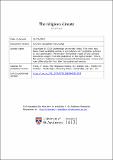Files in this item
The religious climate
Item metadata
| dc.contributor.author | Prest, Julia Tamsin | |
| dc.contributor.editor | Clarke, Jan | |
| dc.date.accessioned | 2023-05-22T11:30:04Z | |
| dc.date.available | 2023-05-22T11:30:04Z | |
| dc.date.issued | 2022-11-01 | |
| dc.identifier | 277051911 | |
| dc.identifier | d987ae38-82fe-4404-8b98-8852f5feeb1b | |
| dc.identifier | 85192634856 | |
| dc.identifier.citation | Prest , J T 2022 , The religious climate . in J Clarke (ed.) , Molière in Context . Cambridge University Press , Cambridge , pp. 28 - 35 . https://doi.org/10.1017/9781108694933.003 | en |
| dc.identifier.isbn | 9781108493215 | |
| dc.identifier.isbn | 9781108694933 | |
| dc.identifier.other | ORCID: /0000-0002-3266-7390/work/135851187 | |
| dc.identifier.uri | https://hdl.handle.net/10023/27663 | |
| dc.description.abstract | Seventeenth-century France was not a place of religious tolerance or inclusion. Jewish people were permitted to settle, under certain restrictions, in parts of the country, and France enjoyed trading and diplomatic relations with, notably, the Ottoman Turks. But both Judaism and Islam were regarded with great suspicion in a country that claimed to base its unity on having one faith, one law and one king. For this reason, the French Protestant (or Huguenot) community came under increasing levels of persecution in Molière’s lifetime. Even within the Catholic Church, there was considerable tension. Louis XIV’s authority was threatened by that of the Pope in Rome and, in France, by the Jansenists, who did not recognize the King’s right to pronounce on matters of individual conscience. More generally, France was steeped in a wider conflict between those who believed that religion should guide all areas of daily life (the dévots) and those who adopted a more relaxed view (the mondains). Although there is no reason to think that Louis XIV objected to Molière’s portrayal of religion and religious hypocrisy in his famous comedy Tartuffe (1664–9), the play thus became caught up in a much broader struggle for religious and political authority. | |
| dc.format.extent | 8 | |
| dc.format.extent | 468089 | |
| dc.language.iso | eng | |
| dc.publisher | Cambridge University Press | |
| dc.relation.ispartof | Molière in Context | en |
| dc.subject | DC France | en |
| dc.subject | PB Modern European Languages | en |
| dc.subject | PN2000 Dramatic representation. The Theater | en |
| dc.subject.lcc | DC | en |
| dc.subject.lcc | PB | en |
| dc.subject.lcc | PN2000 | en |
| dc.title | The religious climate | en |
| dc.type | Book item | en |
| dc.contributor.institution | University of St Andrews. French | en |
| dc.identifier.doi | 10.1017/9781108694933.003 | |
| dc.identifier.url | https://www.cambridge.org/core/books/moliere-in-context/446171B653F3D310A7B7DF7EFF295336 | en |
| dc.identifier.url | https://discover.libraryhub.jisc.ac.uk/search?q=Moli%C3%A8re%20in%20Context&rn=1 | en |
This item appears in the following Collection(s)
Items in the St Andrews Research Repository are protected by copyright, with all rights reserved, unless otherwise indicated.

